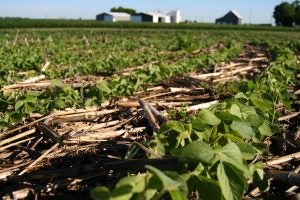This article was contributed by Nimeshkumar Gorani, a student and ambassador with NextGen Ag Impact Network.
Every year on December 5, we celebrate World Soil Day, a movement to promote soil health as an important agenda for every person on our planet.
Soil is an essential but often overlooked resource in attaining a food secure, climate resilient, and hunger-free future. The theme of #WorldSoilDay 2022 is “Soil: Where Food Starts,” raising awareness of the increasing challenges we face in soil management and highlighting how maintaining soil health is critical to both healthy ecosystems and human well-being.
In recent decades, farming has confronted many threats to its ability to safeguard global food security, including climate change, decreasing farm sizes in many countries, and the loss or declining quality of arable land. The UN Convention to Combat Desertification in 2020 warned that “over 33 per cent of the Earth’s soils are already degraded and 90 per cent could become degraded by 2050.”
These challenges are exacerbated by high levels of consumption in wealthy countries, and poor management of the food system, which suffers high rates of food loss and waste, and does not safeguard resources like soil and water. This makes it increasingly challenging to ensure our growing human population has universal access to healthy diets. In addition, many young people consider agriculture to be an unattractive occupation due to the low socio-economic status of many of the world’s farmers, along with frequent uncertainty surrounding in yield and price.
Like us humans, soils need a balanced supply of different nutrients in appropriate amounts to stay healthy. When plants grow, they take up nutrients from soils, depleting soil nutrients with each harvest. Unless sustainable soil management practices replenish soils, fertility is lost over time and soils produce nutrient-poor crops.
Soil nutrient loss is an important and growing threat to human nutrition, as poor soil health lowers crop yields and reduces the amount of food produced. In addition, “Industrialization, wars, mining and intensification in agriculture have left a legacy of contaminated soils around the world,” according to the Food and Agriculture Organization of the United Nations, and this contamination can be so toxic to both plants and animals that it both reduces crop yields and makes the food produced unsafe for consumption by animals or humans.

Safeguarding soil health should be a priority of governments, farmers, and consumers. One solution is youth empowerment. In this digital century, youth have access to a vast amount of robust and up-to-date knowledge at their fingertips. Unlike previous generations, their intellect and digital literacy were stimulated at an early age. Therefore, relevant new agendas should be developed to consider youth as an important stakeholder in food systems and empower them to be responsible and tackle these challenges.
The 50th Session of the Committee on World Food Security took place in October in Rome. There, participants endorsed newly agreed policy recommendations on promoting youth engagement and employment in agriculture and food systems for food security and nutrition. A number of global networks, such as the World Food Forum and the NextGen Ag Impact Network, are already implementing a number of the recommendations, including promoting youth in the agri-food sector, providing capacity building activities, and holding decisionmakers accountable. This will help attract youth to the sector and build a passionate workforce dedicated to sustainability to mitigate current challenges.
We cannot solve today’s problems with the same thinking that created them. Therefore, we all must come together, analyse our current problem-solving approach. One of Indian Prime Minister Narendra Modi’s principles is relevant here; we must address these challenges through “Reform, Perform, and Transform.”
World Soil Day is held annually on December 5 as a means to focus attention on the importance of healthy soil and to advocate for the sustainable management of soil resources.


